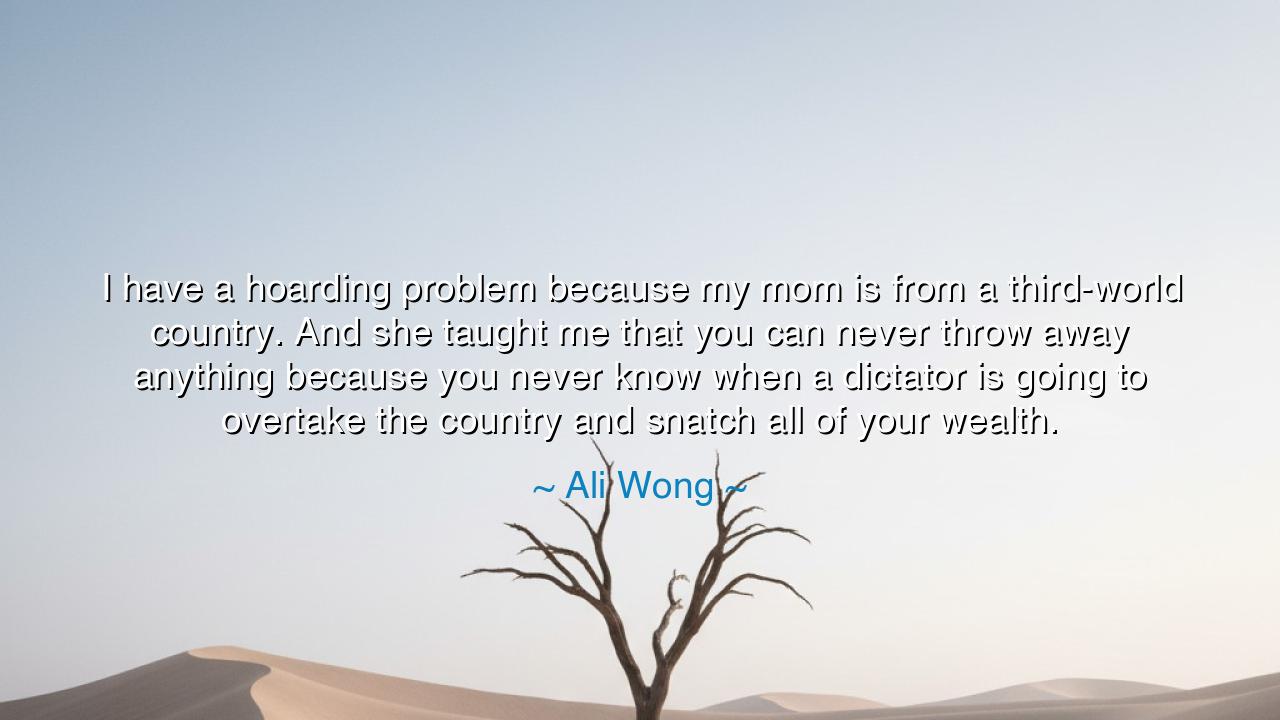
I have a hoarding problem because my mom is from a third-world
I have a hoarding problem because my mom is from a third-world country. And she taught me that you can never throw away anything because you never know when a dictator is going to overtake the country and snatch all of your wealth.






When Ali Wong said, “I have a hoarding problem because my mom is from a third-world country. And she taught me that you can never throw away anything because you never know when a dictator is going to overtake the country and snatch all of your wealth,” she wrapped a great and ancient truth within her trademark humor. Beneath the laughter lies a lesson carved by history, survival, and memory — a truth about fear, resilience, and the inheritance of trauma that passes silently from one generation to the next. Her words are not merely about clutter or storage; they are about the deep instinct to preserve, to protect, to never again be caught unprepared by the cruelty of fate.
In the ancient world, the wisdom of the elders was often born from suffering. Those who survived famine taught their children to guard their grain, even in times of plenty. Those who endured war taught vigilance, even in peace. Wong’s mother, forged in the fire of scarcity, carried within her the memories of instability — the knowledge that prosperity can vanish overnight, that safety is a fragile illusion. This is the legacy of uncertainty, one passed down not through wealth or comfort, but through fear and foresight. In teaching her daughter to keep everything, she was not clinging to things — she was clinging to control, to the idea that one might defy chaos through preparedness.
The ancients would have understood this deeply. After the fall of Troy, the survivors who fled carried with them only what they could hold — the ashes of their home, the tools of survival, the symbols of identity. Aeneas, in the great Roman epic, carried his father upon his shoulders and the household gods in his hands as he escaped the burning city. He could not take everything, but he took what was essential — and that act became the foundation of a new civilization. Wong’s mother, too, through her instinct to save and store, acted from that same ancestral impulse to safeguard continuity — to ensure that nothing of value, physical or symbolic, would be lost again to the flames of history.
There is something deeply emotional in this inheritance. For the child raised in comfort, the hoarding of the parent may seem irrational, even suffocating. But for the parent raised in fear, every object represents security, memory, or survival. A jar, a torn dress, an old document — these are relics, tokens of stability in a world that once betrayed them. When Wong jokes about her “hoarding problem,” she is, in truth, revealing the echo of her mother’s fear living on within her — the way trauma lingers, not in scars on the body, but in habits of the heart.
Her words also invite reflection on a greater paradox of the human spirit — how abundance can arise from scarcity. The mother who once had nothing becomes the guardian of everything; the daughter who inherits stability inherits also the caution that built it. This is how generations evolve: one endures, the next enjoys, and the next forgets — until hardship returns, and memory is reborn. Wong’s recognition of her mother’s teaching, even in jest, is a kind of reverence. She understands that what seems excessive is, in truth, the armor of a survivor — that her mother’s fear, though inconvenient, was forged from wisdom that once saved lives.
History offers many such echoes. After World War II, entire families in Europe and Asia grew up hoarding food, tools, and money — not out of greed, but out of remembrance. The cupboards of postwar households overflowed not with wealth, but with vigilance. Similarly, refugees and immigrants across centuries have carried within them this instinct to save, to hold, to never again be at the mercy of loss. Wong’s quote, though modern and humorous, speaks to this timeless truth: that the past is never gone; it lives quietly in our behaviors, shaping even our smallest actions.
So, let this teaching be passed down to those who come after: understand the roots of your habits. What you call clutter may be courage. What you call fear may be memory. The lessons of our parents, even when they seem strange, were written in the language of survival. Honor them, but do not be imprisoned by them. Learn to hold what is essential — not only in your hands, but in your heart — and to let go of what no longer serves you.
For the wisdom in Ali Wong’s words is both caution and liberation. She reminds us that love itself is a form of preservation — that every object, every precaution, every saved scrap is an act of care from those who once knew hunger and fear. But she also reminds us that healing means learning to live beyond that fear. The balance lies in remembering what the past endured, without letting its shadow darken the present. In this way, the child of survivors becomes something new — not a keeper of fear, but a guardian of gratitude.






AAdministratorAdministrator
Welcome, honored guests. Please leave a comment, we will respond soon